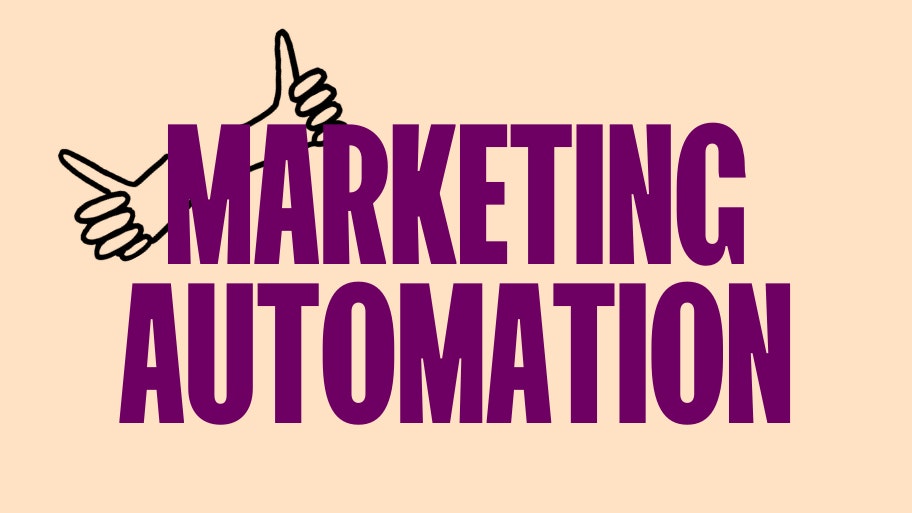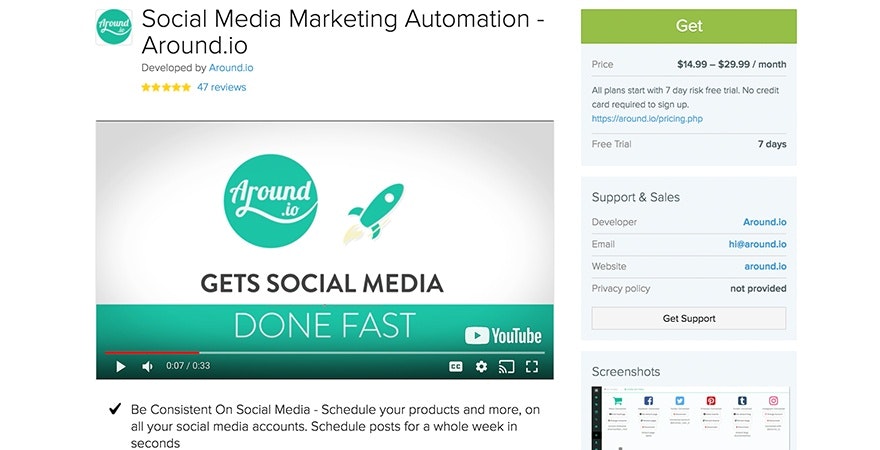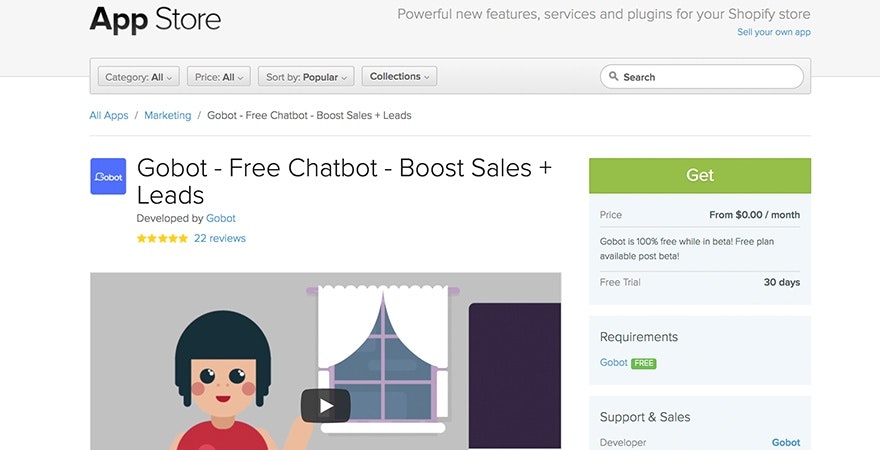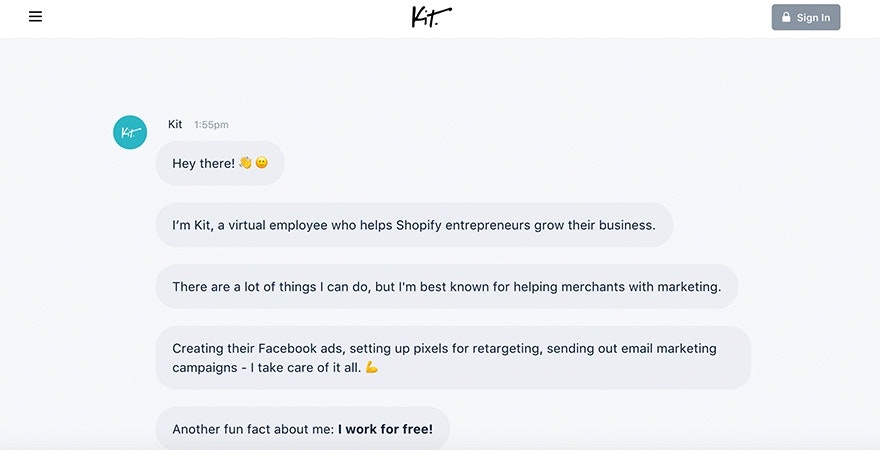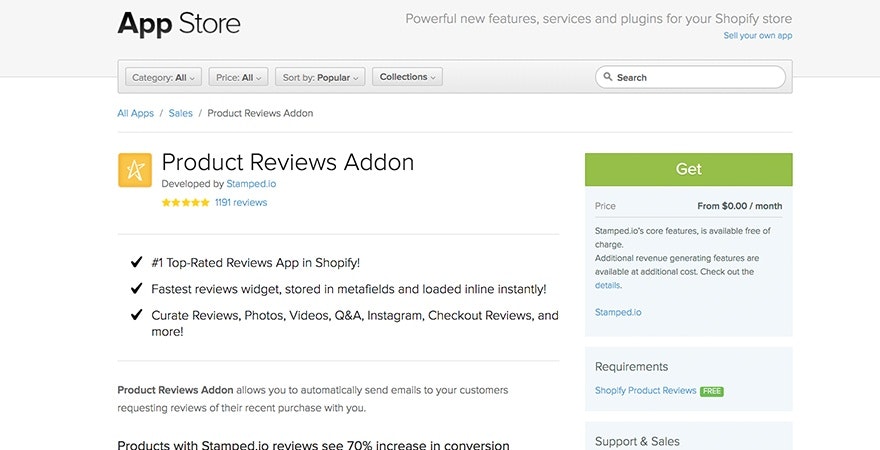Marketing is hard work. Fortunately, marketing automation software can cut your workload in half.
No marketing expertise under your belt? No problem.
Don’t worry if you don’t know where to start.
Truth is, if you saw how bad my first Facebook ad was, you’d be embarrassed for me.
But automation wasn’t as popular back then as it is today.
And those tools can help prevent you from making the same rookie mistakes that I made back when I was starting out.
It’s actually never been easier to complete marketing tasks. Even if you’re a complete rookie.
In this article, you’ll learn what is marketing automation and what the marketing automation definition is. You’ll also understand why automating your marketing is so important and get a list of 15 awesome marketing automation tools.
Post Contents
- What is Marketing Automation?
- Why Marketing Automation is Important
- What Is the Best Marketing Automation Tool
- 15 Best Marketing Automation Software
- Conclusion
- Want to Learn More?



What is Marketing Automation?
Marketing automation is when a software or tool completes a repetitive marketing or sales task instead of a person. This marketing automation definition can apply to any marketing tasks. For example, managing customers with chatbots to running Facebook ads.
The goal is to help businesses get more sales, leads, and customers without needing to hire a bigger team. For instance, an email automation tool might send an email to your customer. On your behalf and at a specific time you specify. While you’ll need to write the email in advance, the tool ensures that the email is sent to every customer that meets your criteria. At the exact time, you request. So, you won’t need to manually send it out at a specific time. Less work for you. Phew!
→ Click Here to Launch Your Online Business with Shopify
When Did Marketing Automation Star
The global marketing automation industry is currently worth $3.3 billion and is expected to nearly double in five years to $6.4 billion in 2024.
But prior to this boom, how did marketing automation actually come about?
Marketing automation began just after the birth of the World Wide Web that gifted the world with publicly available internet. The first marketing automation software came in the form of Unica, a campaign management tool. This was as early as 1992, but the industry’s rise only began to pick up steam after the turn of the millenium.
Today, marketing automation is everywhere and forms a crucial part of all businesses – large or small. In fact, three out of every four marketers are using at least one type of marketing automation software.
Why Marketing Automation is Important
Studies have shown that marketing automation can help increase sales productivity by 14.5 percent and reduce marketing overhead (non-labor costs) by 12.2 percent.
Plus, four out of every five marketing automation users report an increase in their number of leads.
I can keep going, but the numbers are clear – no marketing strategy is complete without the incorporation of marketing automation.
Benefits of Marketing Automation
Automation is important for four key reasons: increasing sales, saving time, maintaining consistency, and improving optimization.
- Helps increase sales: Marketing automation platforms can help you increase sales by having your tool act as your salesperson. Tools that automate the delivery of product discounts or create Facebook ads, can help you increase your sales. A human might not recognize the patterns that a machine might be able to see which allows for it to perform better than an expert.
- Saves you time: As your business grows these tools can manage higher than usual volumes of work better than a team of people can. For example, a product review app will be able to send automated emails to customers who’ve received their order so that you don’t need to manually track it. Thus, giving you one less thing to worry about.
- Maintain consistency: The hardest part of marketing is being consistent with it. Scheduling social media posts every day often gets lost as your workload gets heavier. You only need to automate processes once a week or less to schedule social media posts, create ads or other marketing tasks. It allows you to continue to stay active and visible to your customers.
- Helps you better optimize your marketing: Of course, automating your marketing can optimize your ads based on its current performance. However, as the tools perform more tasks for more brands, it’ll eventually start to optimize your marketing with your data to better fine tune your business’ sales growth.
What Is a Marketing Automation Specialist
You must now be thinking: There’s so much involved in marketing automation! Do I need to be a marketing automation specialist or hire one to be able to implement a marketing automation strategy for my business?
The answer is both yes and no.
A marketing automation or specialist’s job is to be able to recognize where automation can best help your business. He/she doesn’t require a technical background like engineering or computer science to be able to execute the job well.
A marketing automation specialist needs to understand how sales, marketing, and technology work and most importantly, how they work together. It also helps to have a good grasp of data analysis and understanding to be able to maximize ROI.
But hey, I understand that not all businesses have the luxury of hiring a marketing automation specialist. So while it certainly helps to have a specialist on your team, if you’re a budding ecommerce entrepreneur, this will probably be beyond your budget.
Don’t worry. As I’ll go into later in the article, there are tons of easy-to-use and affordable ecommerce marketing automation tools available on the market to help your ecommerce business – regardless of what stage it’s in.

Why Do You Need Marketing Automation
Technically speaking, you don’t actually need marketing automation to run a business. After all, that’s how our forefathers managed traditional commerce.
But considering the benefits of marketing automation listed in the above section, it would be a shame to not take advantage of all that marketing automation can offer you and your ecommerce business.
Plus, you can be sure that your competitors are using marketing automation in one form or another. Not doing so is a near-guarantee that you’ll be left out of the race.
As we’ll see in the next section, there’s a host of different marketing automation solutions you can choose from. From content marketing automation to ecommerce marketing automation, the options out there have you spoilt for choice.
But that’s also not to say you should be going full-on and using every single solution there is.
What Is the Best Marketing Automation Tool
Marketing automation systems can be rather costly, and to make the most of it at minimal cost, you need to first understand how and where marketing automation can best help your ecommerce business and the ideal tools available for that.
Needs can differ from business to business, and that means that the best marketing automation tool for your competitor may not necessarily be what’s best for you.
That said, there are some industry best practices you should definitely be including in your marketing automation handbook.
Marketing Automation Best Practices
- Leave no automation trail. It’s one thing to know that everyone’s using marketing automation tools, another to, say, reveal it in an email to a customer. Make sure to clean up all tags and custom fields to avoid things like: “Hello {{First_name}}”.
- Understand your customers’ purchase cycle. Implementing marketing automation without understanding the purchase flow of your customers is a wasted opportunity. By mapping out their journey, you can target them with the right messages at the right time.
- Create actionable next steps from data. Nearly all marketing automation solutions today come with an internal data reporting feature. Analyze this thoroughly to create actionable next steps for your marketing strategy. It’s all about improving, improving, and improving.
- Segment your customers and leads. Not all customers are equal. When using email marketing automation tools or loyalty marketing automation tools, personalize your messages to cater to the different categories of customers. You can’t be thanking a client for his loyalty and offering him rewards if he’s only carried out one purchase.
Now that you have an idea of the main takeaways of the marketing automation bible, let’s jump into the best marketing automation solutions available for your ecommerce business.
15 Best Marketing Automation Software
In this section, we’ll go into the different marketing automation solutions available on the market to help boost your ecommerce business.
Social Media Marketing Automation
1. Buffer
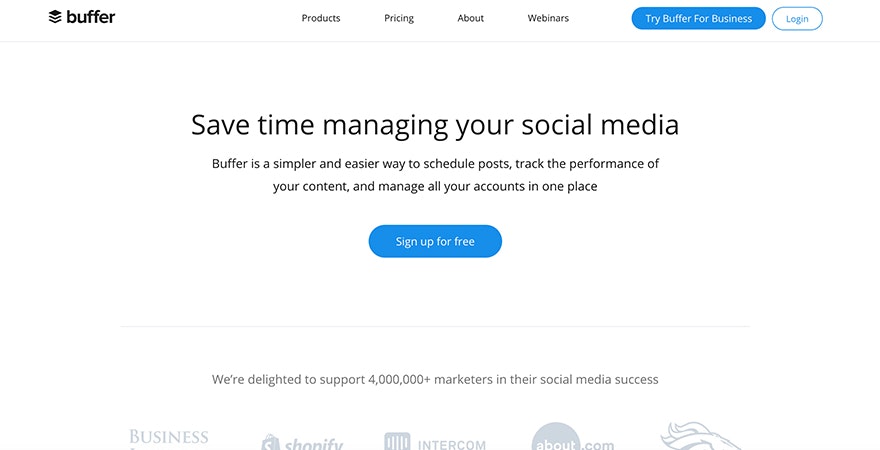
One of the biggest challenges with social media marketing is mastering consistency. With Buffer, you can add up to ten social media posts at a time for free which will go out automatically. So if you find you’re always forgetting to post on social media this is the social media automation tool to try out. My favorite feature about Buffer is the data analytics you get. You can see how many people clicked your link, your reach, and more. Buffer will also let you know what your top posts are. By looking at this data, you can better understand what works well on social to increase social media engagement.
2. Around.io
Around.io‘s marketing automation software helps you post on social media more often by automating those processes but it has an added ecommerce twist. Since the app connects to your store, you can post products to your social accounts to get some sales. It saves you time by allowing you to schedule all of your posts in advance. You won’t forgetting to post on social media anymore. It even allows you to add GIFs and other engaging content to your social accounts.
Content Marketing Automation
3. Hubspot
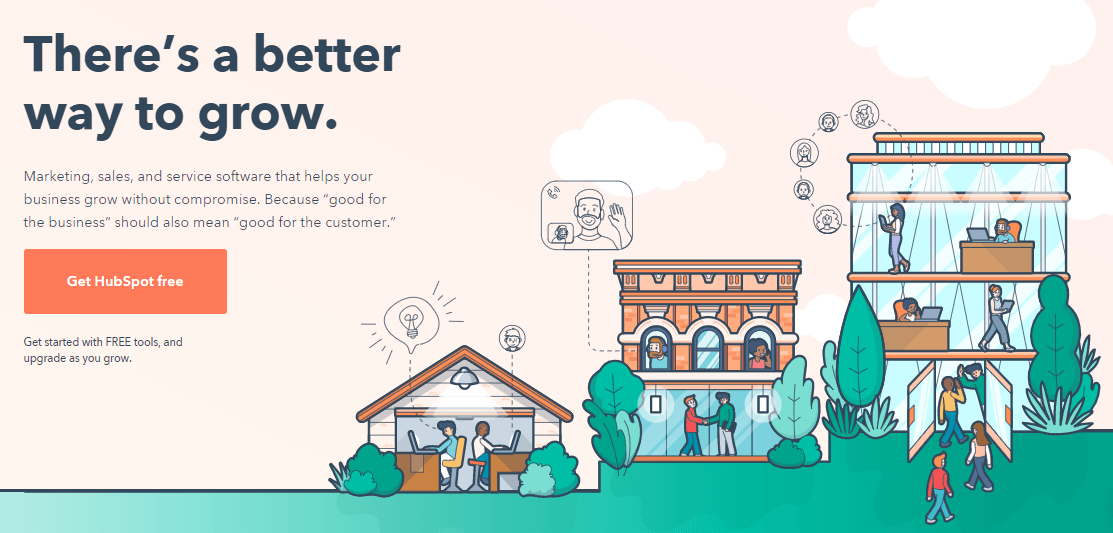
As one of the leaders in marketing automation, Hubspot is an all-in-one inbound marketing software that offers tools for marketing and sales. Its software focuses heavily on inbound and its content creation and content optimization features can be considered to be second to none. Creating landing pages, emails, etc. is quick and easy with Hubspot, making it perfect for content marketing.
4. Gobot
Gobot has one of the trendiest marketing automation software: chatbots. You can use chatbots to help minimize the customer support work you or your team needs to do. They can collect emails, schedule meetings, and take polls all while handling your customer service. If you struggle to manage customer inquiries this marketing automation tool could save you time. And with a drag and drop functionality, it’s never been easier to automate customer support.
Ecommerce Marketing Automation
5. Kit
Kit is the kind of marketing automation software you’ll use when you’ve struggled to create a successful ad campaign on your own. It’s perfect for people with busy schedules or full-time jobs, especially since they’ll regularly send notifications offering you help so that you make your marketing a priority for your online store.
Kit’s artificial intelligence keeps getting smarter with each sale you receive, perfectly optimizing your product ad for the right customer. They keep adding new marketing features to simplify the process for you like sending marketing emails.
6. Postcard Marketing
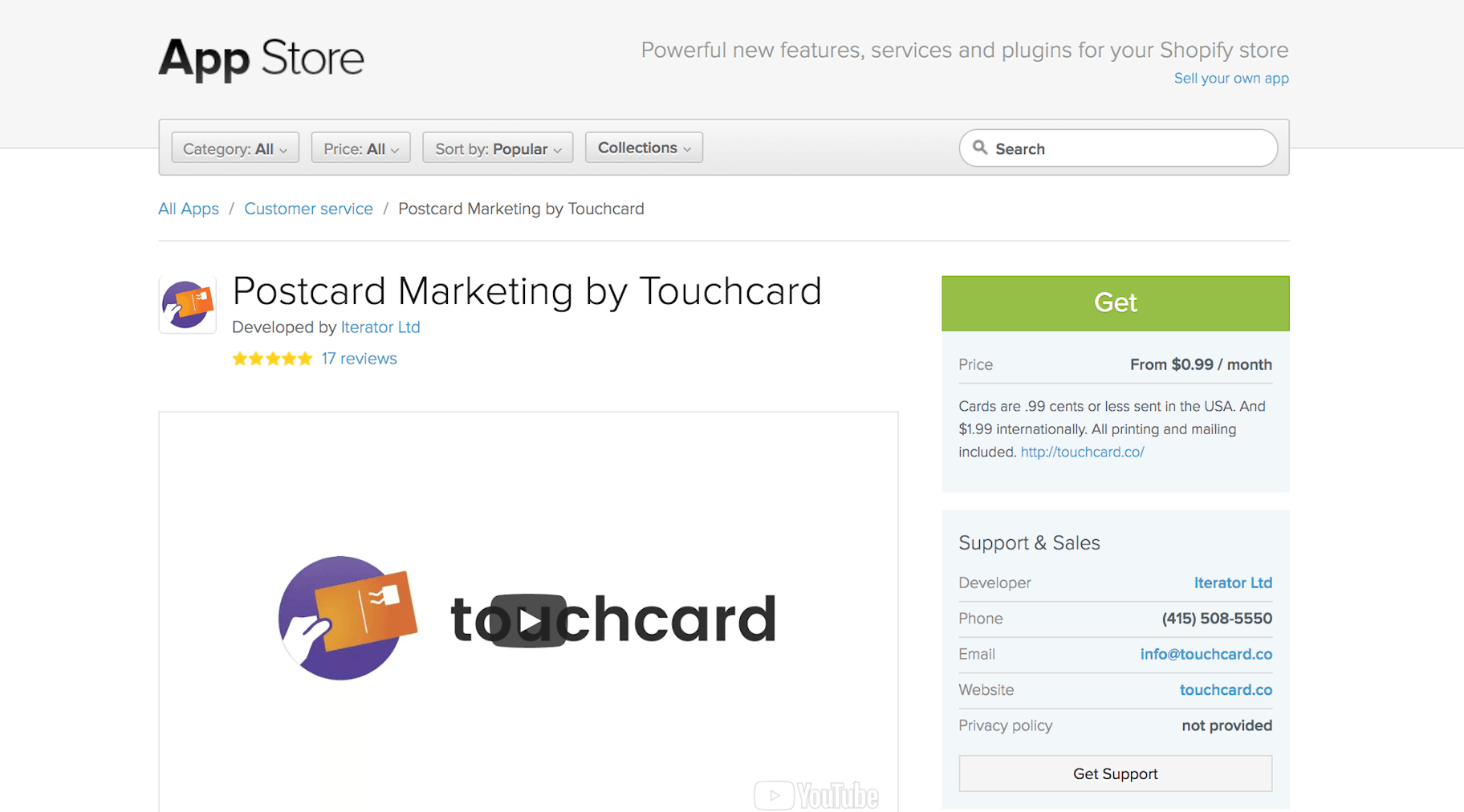
With online ads crowding up social networks, some marketers have decided to stand out using traditional marketing methods. Marketing automation tools like Touchcard allow you to mail postcards to your customers with minimal labour on your end. Your postcards can include limited time coupon codes to help convert the sale. If you’re looking to stand out from your competitors, marketing automation tools like this one help automate your real world marketing so you can focus on the virtual one.
7. PushOwl
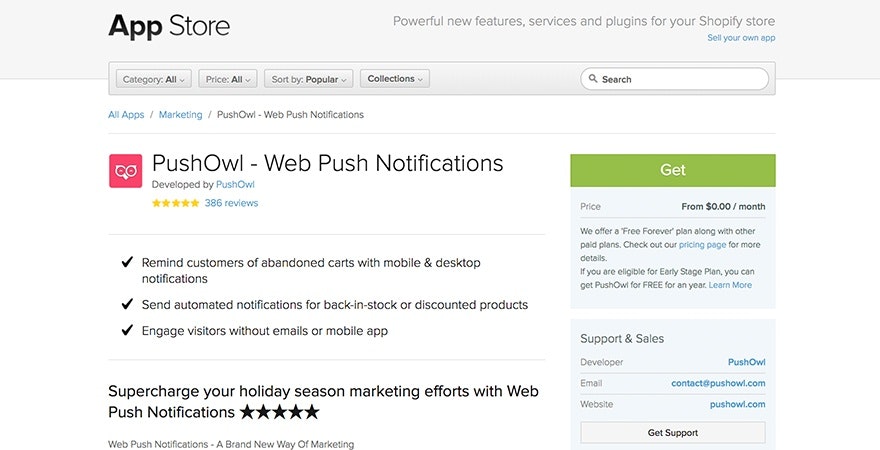
PushOwl’s automation software automates the delivery of push notifications. If you have a push notification app on your store, your customer can choose to accept it. This will result in a pop-up appearing on their screen when you send them updates. The best part is that they don’t need to be browsing your website to see these little notifications pop-up. If customers abandon their cart, you can send push notifications to remind them to recover it as soon as they leave your website.
8. LeftBrain
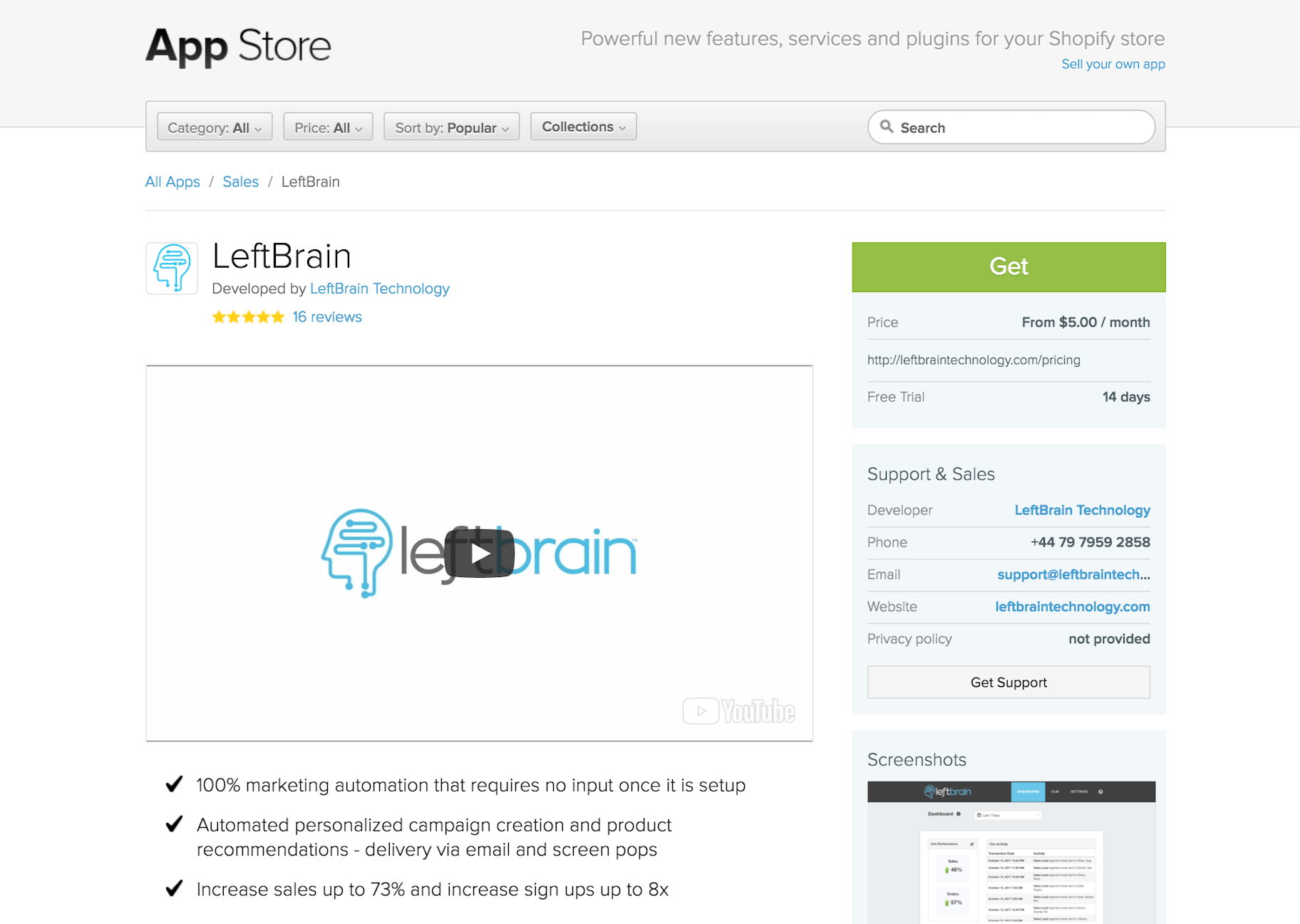
Marketing automation platforms like LeftBrain help you segment your customers into different audience groups. Then, they send those segmented customers different product recommendations with a personalized coupon code to encourage more sales. If you’ve ever wanted a marketing automation software that automates personalization then this automation tool is for you.
9. Simple Shop Automation by Hextom
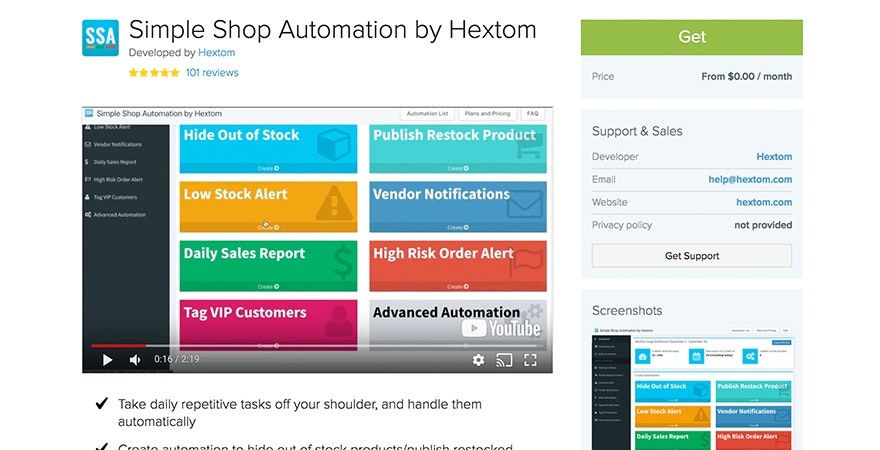
Hextom‘s tool automates the process of hiding out of stock items, alerting customers of low stock items, publishing newly stocked items and more. If you’re dropshipping a lot of products, it can be difficult to keep track of all your suppliers’ inventory. With a marketing automation tool like this, you can set it and forget it. You won’t need to worry about angry emails from customers who bought a sold out product. Plus, alerting customers of low stock items can actually work in your favor from a scarcity standpoint. So it can even help encourage sales.
Mobile Marketing Automation
10. SMS Marketing and Automation by SMSBump
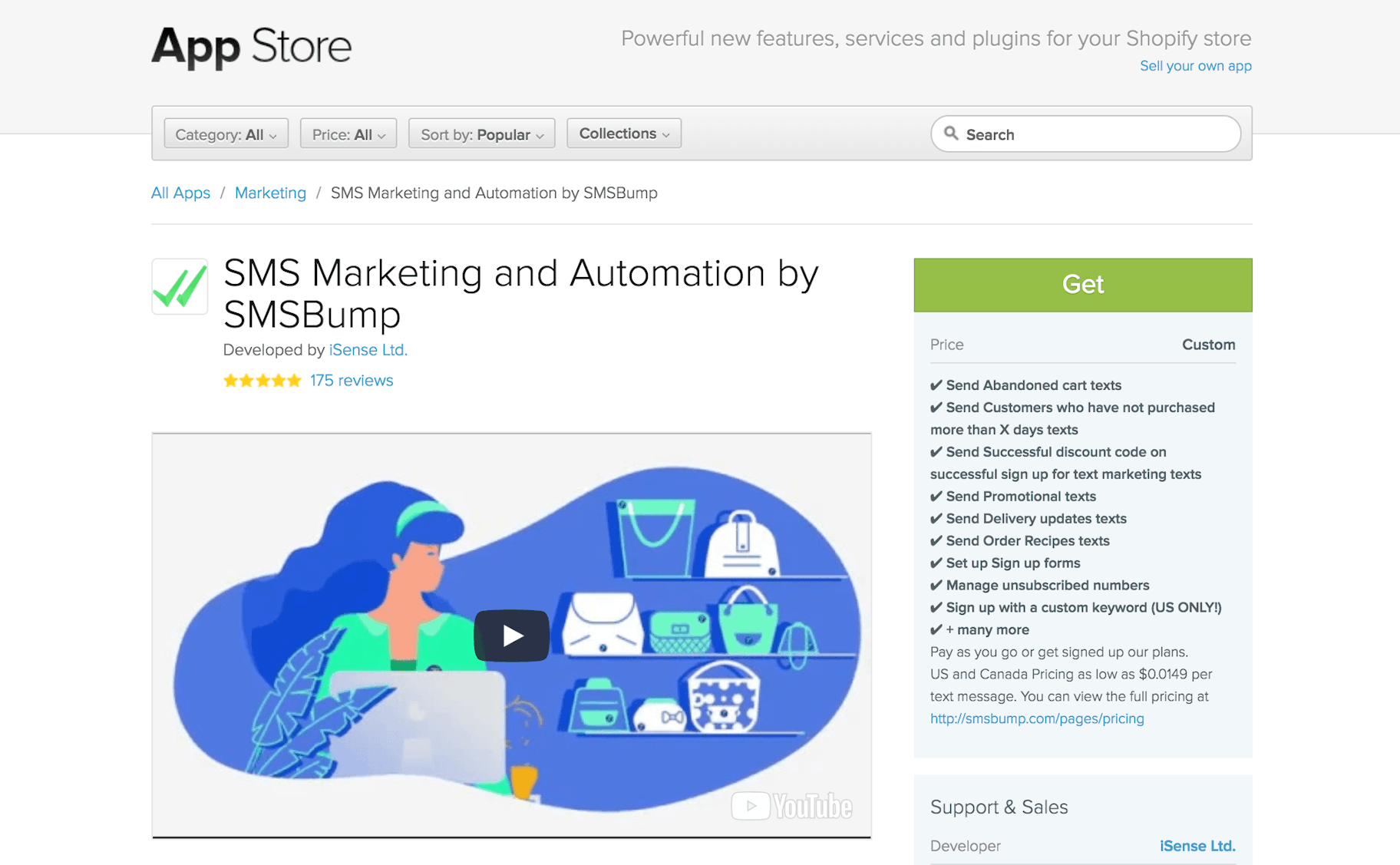
With new marketing trends popping up all the time, SMS marketing is one that won’t be going away anytime soon. Marketing automation platforms like SMSBump allow you to send abandoned cart texts, text customers who haven’t purchased in a certain number of days, offer discount codes via text, text deliver updates and much more. If you want to automate your SMS marketing, this is the perfect marketing automation software to try out.
Advertising and Loyal Marketing Automation
11. Shoelace
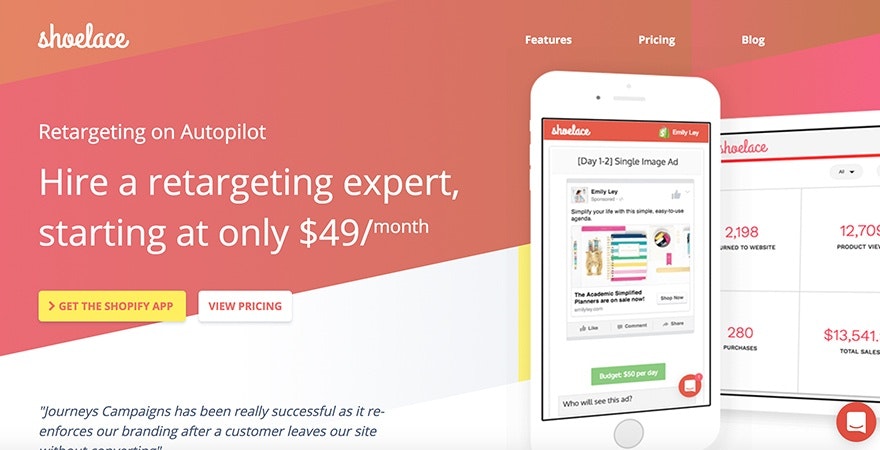
Shoelace’s retargeting automation tool creates retargeting ads that help recover abandoned carts and win back customers after they’ve left your store without purchasing. There’s a proven formula for creating retargeting ads that work and Shoelace’s team has mastered it. If you have a high abandoned cart rate, you can win back your customers. But keep in mind that your store needs to be optimized and have a professional store design for best results.
12. Marsello by Collect
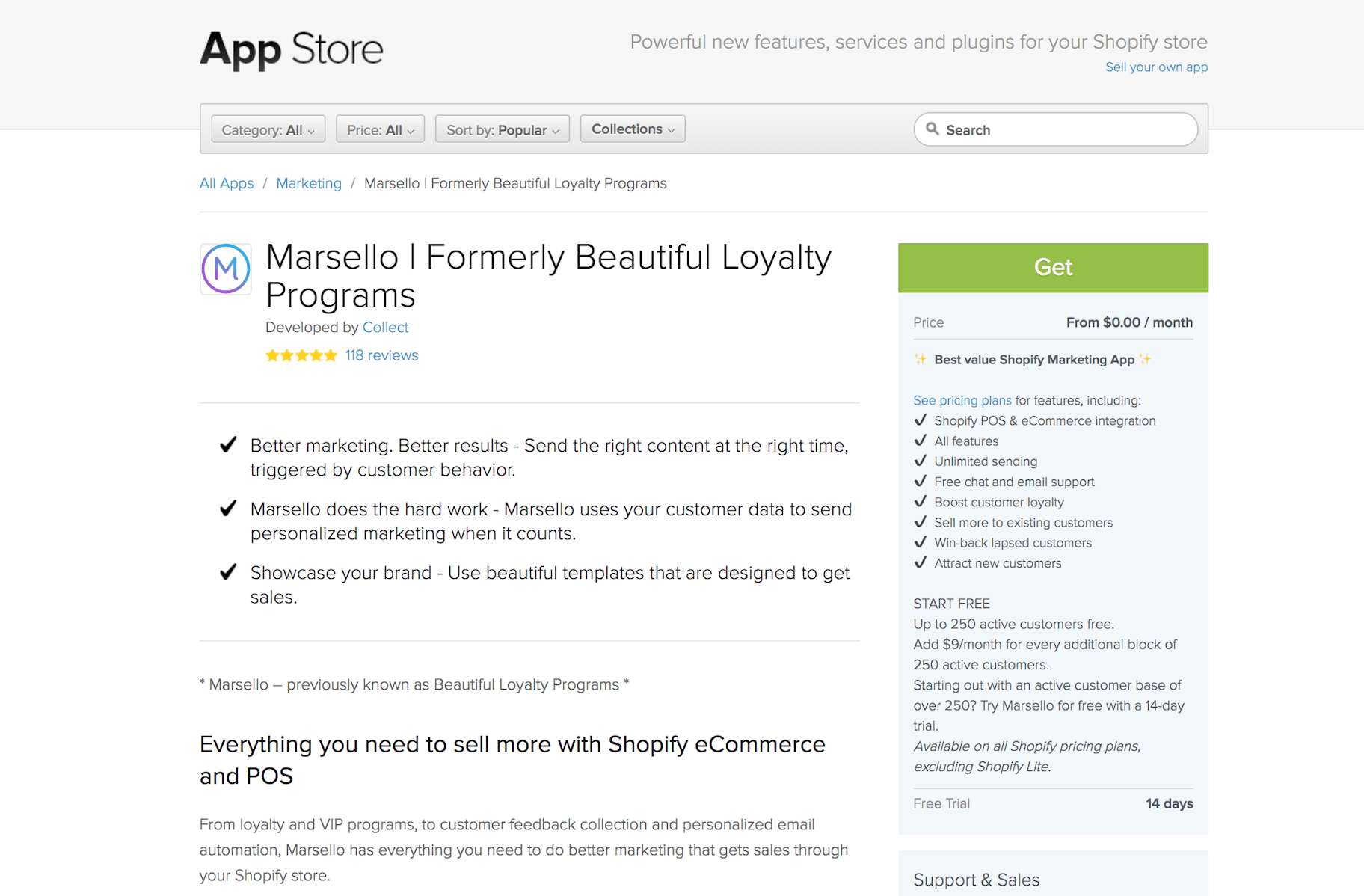
Want to encourage customer loyalty or create a VIP program? Well, with marketing automation tools like Marsello it’s never been easier. You can reward points to customers to help encourage customers to keep shopping. Birthday offers can also be sent out to customers automatically. You can even send automated emails to increase your customer return rate. This marketing automation software helps automate customer loyalty to help you maintain your existing customers.
Email Marketing Automation
13. Product Reviews Addon
Product Reviews Addon automates the process of collecting product reviews. These reviews help prove to first-time shoppers that your store is the real deal. With emails sent out to new customers, this marketing automation tool does the hard work for you. As your customer base grows, so will the number of reviews your store collects. Customers are able to write their review directly in their email making it an easy experience.
14. Spin a Sale
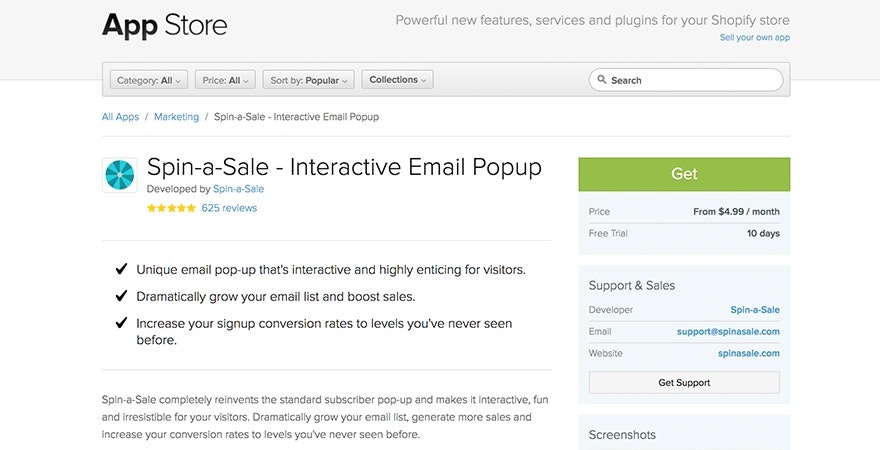
Spin a Sale automates the process of building your email list and offering customers discounts. As email marketing is an effective way to generate sales, growing your email list is an important practice. This tool gamifies the experience by offering customers a discount in return for their email address when they try to leave your store. And hey, you may even be able to generate a few sales from this app.
Automated Marketing Reporting
15. Data Export
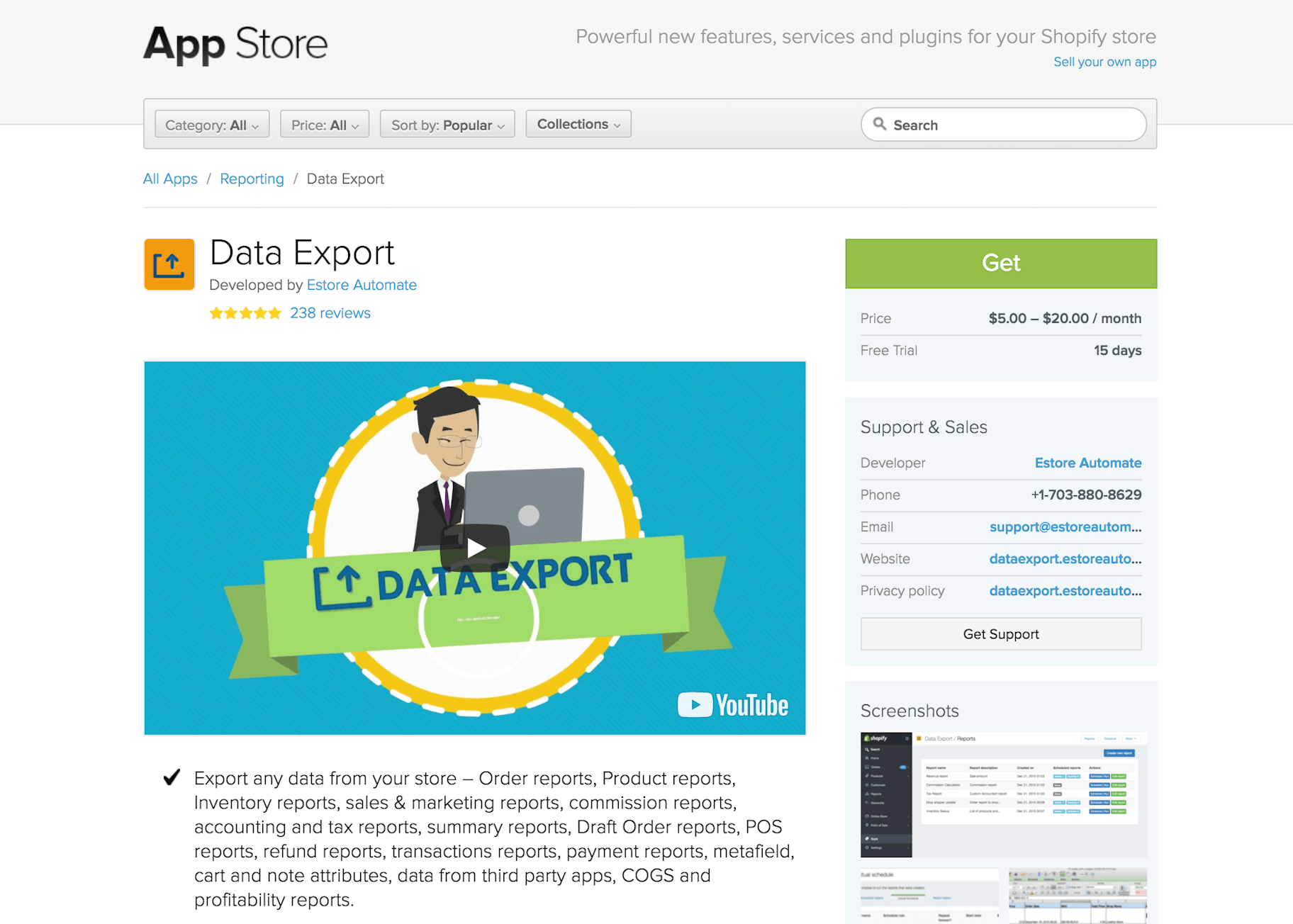
It’s not only about automating traditional marketing tasks. It can also be about automating your reports and data. Sure, you could spend hours analyzing and digging through your marketing reports. Or you could use the marketing automation software Data Export to do that for you. Your reports can be emailed to you hourly, daily, weekly, or monthly depending on how many sales you get. You can choose which data points you’d like included in your report instead of having to read through countless reports to compile the numbers for you.
Conclusion
As an online retailer, you’re responsible for marketing and customer support. And that can be time-consuming. If you want to succeed as a solopreneur, using these tools can allow you to focus on what matters. Since you’re automating tasks, be sure to get the upfront work done right. Maybe ask a friend, colleague or mentor to look at your initial email or push notification before committing to it. Marketing automation tools are the way of the future. Your future success has never been easier to attain.



